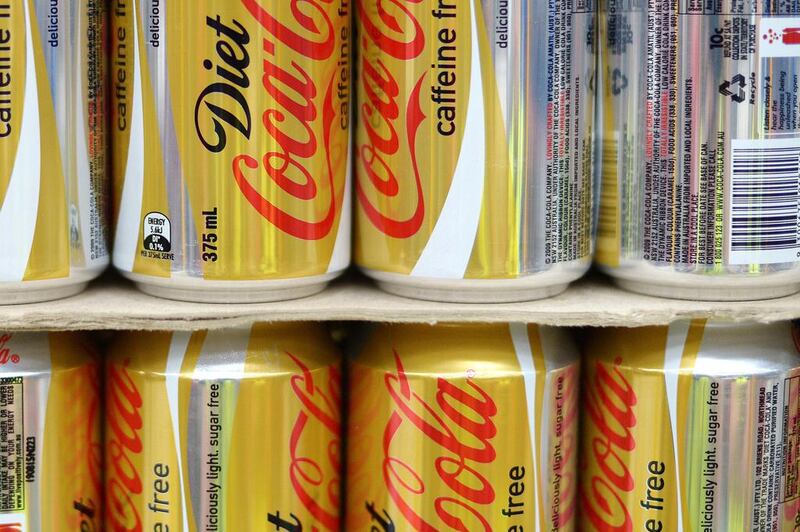It’s enough to make anyone on a diet give up in despair. First, scientists warn of the dangers of drinking too many sugary drinks, pointing to links with weight gain, diabetes and heart attacks.
Now they’re saying the sugar-free alternatives increases the risk of stroke and dementia.
As the world’s 17th largest per-capita consumer of soft drinks – second only to Saudi Arabia in the region – this is clearly bad news for many UAE residents, more than 60 per cent of whom are overweight or obese.
It comes from an authoritative source, the peer-reviewed journal Stroke, which has published the findings of research by teams at Boston and Tufts universities in the US.
And the headline finding is disturbing. According to their long-term study of thousands of people, drinking one or more artificially sweetened soft drinks a day triples the risk of stroke and Alzheimer’s disease.
That’s a scarily big rise in risk. Yet the researchers say their findings are in line with earlier studies suggesting a link between stroke and low-calorie drinks. What is new, however, is the claim of a link with dementia.
So what could possibly explain the connection?
The team points out that other studies found links between higher intake of low-calorie drinks and increased risk of high blood pressure, the single biggest risk factor for stroke.
Other studies have also hinted at a connection between low-calorie drinks and diabetes – a risk-factor for stroke and Alzheimer’s.
So it looks like there’s no way around it: low-calorie drinks pose a major threat to our health.
Except that’s not what the researchers conclude. In the final paragraph of their paper they state merely that “artificially sweetened soft drink consumption was associated with an increased risk of stroke and dementia”, and call for more research.
But wait a moment – what happened to that three-fold increase in the risk of stroke and Alzheimer’s? Did the media reporting the study make all that up?
Not at all. Those figures come from the paper’s abstract, summarising its content.
Only by reading the full paper, wading through all the technical stuff and unpicking the results can one get a real feel for how strong the evidence is.
And if you do all that, the conclusion is not very.
The fact is that, like tabloid headlines, the abstracts of academic papers are often far more exciting than the text that follows.
But there are often clues in such abstracts about the real strength of the story.
In the case of the Stroke study, the first warning sign is the size of the numbers involved in the study – not the impressively large numbers of records that were analysed but the far smaller numbers of stroke or dementia cases they contained.
As with any statistical study, the smaller the numbers, the more uncertain the conclusions become.
And with fewer than 100 for either stroke or dementia being found in the Stroke study, the error bars on the estimated risks are wide.
That, in turn, means that they don’t carry much evidential weight, making plausibility a key issue.
So while the abstract highlights a tripling in risk of stroke and Alzheimer’s, those figures need to be backed up by similar findings from other studies if they’re to be taken seriously.
Yet while the researchers point to other studies that also found some increase in risk, none of them found anything remotely close to a tripling.
Come to that, neither did the Stroke paper. While the headline-grabbing tripling in risk appears in the abstract, it fades away and finally vanishes in the study altogether.
That’s because the researchers have to adjust their risk figures for so-called confounder variables, such as smoking, fitness level and history of high blood-pressure that might create false links between low-cal drinks and health threats.
For example, it’s a safe bet that many people who get sunburnt will have also drunk soft drinks. But the link doesn’t mean the drinks caused the sunburn, as there’s an obvious confounder: sunshine.
In the Stroke study, the researchers carefully adjust for a host of such confounders – and the effect is startling.
All the estimated risks become smaller, and in the case of dementia they became so small they are no longer “statistically significant” – suggesting they’re the result not of low-calorie drinks but pure fluke.
Yet none of this is clear from the abstract, which fails to quote the fully adjusted risk figures at all. But it does mention a finding that casts doubt on its dramatic claims.
The researchers could find no evidence of a much more plausible link between stroke, dementia and drinks that really do contain sugar.
So where does all this leave us? After reviewing the paper, researchers at the UK National Health Service's Behind the Headlines website concluded that the evidence of a link between low-calorie drinks, stroke and dementia is "weak".
But the Stroke study is hardly unique in that.
Every week, leading journals publish studies claiming to have cast light on a host of health issues. And all too many of them are questionable at best, and sometimes plain baloney. Critiquing research is now a key part of scientific training but there are some rules of thumb that anyone can use.
First, while leading peer-reviewed journals do publish top-quality research, the flip-side isn’t true. Implausible research claims can and do appear in the top journals.
Size of study matters: with more data, it becomes easier to rule out random effects and confounders.
But more important still is the type of study.
The best are so-called double-blind randomised controlled trials, where people are randomly allocated to the various comparison groups, with both they and the scientists being “blind” as to what happens in each.
The most effective rule of thumb is also the simplest: if a study outcome seems ludicrous, it probably is. Extraordinary claims require extraordinary weight of evidence.
While there may be some link between low-calorie drinks, stroke and dementia, there’s nothing remotely compelling about the evidence to date.
But anyone preferring not to take chances can always switch to a low-calorie drink with rigorously proven health-giving effects: water.
Robert Matthews is visiting professor of science at Aston University, Birmingham, UK
newsdesk@thenational.ae





